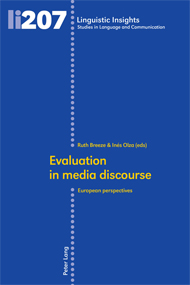La evaluación en el discurso tradicional y on line de los medios, en el punto de mira de un libro del ICS
Peter Lang, sexta mejor editorial académica del mundo, ha publicado ‘Evaluation in Media Discourse’, que analiza discursos de medios de España, Reino Unido, EE.UU., Holanda y Alemania

Las investigadoras Inés Olza y Ruth Breeze, del proyecto ‘Discurso público’ del Instituto Cultura y Sociedad, han editado un libro que analiza y compara cómo evalúan y valoran diversos medios de comunicación en sus discursos. El volumen, titulado Evaluation in Media Discourse, ha sido publicado por la editorial Peter Lang, la sexta mejor editorial del mundo según el Scholarly Publishers Indicators (SPI).
Según las autoras, el discurso de los medios no solo lo conforman los mensajes que se envían a lectores, oyentes o espectadores, sino que también es un fenómeno social que afecta a la forma en que la gente ve el mundo. “El objetivo del libro es analizar las estrategias de evaluación (es decir, de valoración o expresión de la subjetividad) presentes en los medios”, ha explicado Olza.
El libro cuenta con la participación de varios investigadores de otros centros y universidades españolas y extranjeras. Los autores desarrollan herramientas para abordar la evaluación y valoración que se realiza en el discurso de los medios de comunicación y comparan el discurso tradicional y el digital.
A lo largo de ocho capítulos analizan los discursos de medios de España, Reino Unido, EE.UU., Holanda y Alemania. También estudian los discursos ‘no oficiales’, es decir, lo creados por usuarios y bloggers, o comentarios en diarios que pueden tener la misma repercusión que los mensajes lanzados por los medios.
Según explican Breeze y Olza en la introducción, con su investigación querían comprender cómo habían cambiado “la naturaleza de los lenguajes de los medios (formalidad, informalidad, discursos en grupo y fuera del grupo)” y “la naturaleza de lo que puede ser realmente descrito como un discurso mediático (los discursos de las redes sociales, de los medios ‘oficiales’, de foros y comunicaciones multimodales)”.
Evaluation in Media Discourse se inscribe en el proyecto FFI2012-3639 del Ministerio de Economía y Competitividad (Proyecto ‘Metadiscurso y lenguaje evaluativo: perspectivas teóricas y de análisis en el discurso periodístico’).
Capítulos y autores1. Introducción, Ruth Breeze e Inés Olza.
2. Stancetaking and inter/subjectivity in journalistic discourse: The Engagement system revisited, Juana I. Marín-Arrese.
3. Concession in evaluative argumentative discourse: The semantics, pragmatics and discourse functions of but and although, María de los Ángeles Gómez González.
4. Evaluation in the headlines of tabloids and broadsheets: A comparative study, Laura Alba-Juez.
5. Negotiating futures in socio-technical controversies in the media: strategies of opinion orientation, Paola Catenaccio.
6. The banality of evil. A study about translating “los desaparecidos” in the German and English press, Frank J. Harslem.
7. “A life well lived of a lady well loved”: The power of appraisal in the comments section, Isabel Corona.
8. The evaluative potential of colonial metaphor scenarios in (written) media representations of Spain’s economic expansion. Spanish investors as forceful aggressors or audacious pioneers?, Jasper Vandenberghe.
9. Re-articulating critical awareness about racism in public discourse: Changing one’s mind on the Black Pete debates in the Netherlands, Jan Zienkowski.





